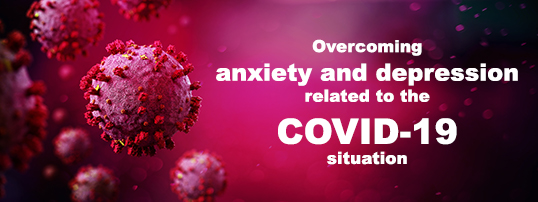
Is the COVID-19 situation leaving you anxious and depressed? It’s important to know that you are not alone. It might be helpful to envision many boats on the same ocean of turmoil and realize that you are the captain of your solitary boat, alone but not really alone. “We are all going through this, but it doesn’t have to define us,” says New Horizons counselor Brenda Roberts, EdD, LPC-S, LMFT.
As they say, we are all in this together. You are sharing the same situation with millions of other people throughout the entire world. As captain of your boat, you have the power to work through and overcome these sometimes-debilitating feelings.
This current environment brings with it several points of worry. There is the worry that we or someone we love may contract COVID-19. This could mean severe illness that has been said to feel many times worse than the flu. It could even mean death for you or a loved one.
Another worry that looms is the loss of one’s livelihood. How will you pay your bills? How will you pay for food and other necessities? What about rent or the mortgage or automobile notes? How will you take care of your loved ones?The utter uncertainty of what’s going to happen next, from wondering when the basic dangers of COVID-19 have waned to wondering when we can again begin earning a living is a helpless situation for anyone to find themselves in.
Acute Stress Disorder Criteria
Recognizing the roots of the problem is helpful. According to Vaughn M. Bryant, III, PhD, LMFT-S, LPC-S, LCDC-CCS, if you are feeling anxiety and depression about the COVID-19 situation, you may be experiencing Acute Stress Disorder. ASD is recognized by the American Psychiatric Association in the Diagnostic and Statistical Manual of Mental Disorders (DSM), the handbook used in the mental health care professions.
The DSM-5 lists four criteria of ASD, including the following:
- Directly experiencing the traumatic event;
- Witnessing in person as it occurred to others;
- Learning the event happened to a significant other; and
- Experiencing repeated or extreme exposure to adverse details of the traumatic events.
Dr. Roberts says that the virus consequences “have been a disruption in what we’ve come to expect as normal in our day to day life.” Roberts added that “ASD is what we are all going through with COVID-19.”
All of us are directly experiencing the trauma caused by COVID-19. There is no way you can escape the fact that a life-altering pandemic is changing the world and that this event will forever change the world as we knew it. In all likelihood, the world will never again be the same as it was only a few short months ago. Life changed so suddenly. Thousands upon thousands have died and many others have experienced the debilitating and extremely painful effects of COVID-19. Hundreds of thousands of people have lost their life.We are repeatedly being exposed to the tragic details of the COVID-19 situation. You simply cannot get away from being continually exposed to news of the virus or consequences of the event. From news broadcasts, Internet recounting and social media, there is absolutely no escape. Many people have chosen to forgo the news, yet it is difficult if not impossible to ignore the empty stores, homes and streets of the stay at home orders, the television commercials trying to offer comfort and reassurance or being in the position of having little to no income. Being at home minding stay at home orders is yet another stress-inducing condition.
For many, one of the primary causes of ASD became real in that they have watched a loved one or even a casual acquaintance succumb to the illness caused by the virus or having a loved one die from the effects of COVID-19. Towards the end of April 2020, Louisiana endured more than 26,000 COVID-9 reported cases while experiencing nearly 1,600 deaths. Within the United States, Louisiana has ranked as a hotspot for occurrences of the virus. The parishes of Allen, Beauregard, Calcasieu, Cameron and Jefferson Davis have experienced 542 hospitalized cases and 44 deaths. These parishes have hardly seen the end of the pandemic. This is a frightening fact.
Acute Stress Disorder symptoms
If you are experiencing “nine or more of the following symptoms from any of the five categories of intrusion, negative mood, dissociation, avoidance and arousal,” according to Dr. Bryant, and these symptoms “begin or worsen after the traumatic event(s) occurred,” you may be undergoing ASD. Symptoms must last longer than three days and not be the result of drug use.
Intrusion symptoms
- Recurrent, involuntary and intrusive distressing memories;
- Recurrent distressing dreams;
- Dissociative reactions – flashbacks; and
- Intense prolonged psychological distress or marked physiological reactions in response to internal or external cues that symbolize the traumatic event.
Negative mood
- Persistent inability to experience positive emotion;
- Inability to experience happiness;
- Inability to experience satisfaction; and
- Inability to experience loving feelings.
Dissociative symptoms
- An altered sense of the reality of one’s surroundings or oneself; and
- Inability to remember an important aspect of the traumatic event. When the traumatic event persists for an extended length of time, this symptom can manifest as short-term memory problems in the present.
Avoidance symptoms
- Efforts to avoid distressing memories, thoughts or feelings about or closely associated with the traumatic event; and
- Efforts to avoid external reminders that arouse distressing memories, thoughts or feelings about the traumatic event.
Arousal symptoms
- Sleep disturbance,
- Irritable behavior and angry outbursts;
- Hypervigilance;
- Problems with concentration; and
- Exaggerated startle response.
Now what?
Dr. Roberts says, “There is a cure to ASD, and that cure is resilience. Without addressing one’s ASD, the disorder may advance into becoming Post Traumatic Stress Disorder. Practicing resilience is the key to improving one’s mental and emotional health.”
Ok, so what exactly is resilience in the context of ASD? In the National Center for Biotechnology Information, U.S. National Library of Medicine journal article Understanding resilience, the authors write that “Resilience is the ability to adapt successfully in the face of stress and adversity. Stressful life events, trauma and chronic adversity can have a substantial impact on brain function and structure and can result in the development of posttraumatic stress disorder (PTSD), depression and other psychiatric disorders.”
“Setting in place certain mental and emotional tools will promote healing in someone suffering from ASD,” says Dr. Roberts. “An important benefit of successfully dealing with ASD is that you will find that you are stronger and more confident. We all have more courage and resilience than we know and ASD is a test of our skills of resilience,” she added.
The journal article defines resilience “as the process of adapting well in the face of adversity, trauma, tragedy, threats or significant sources of stress.”
Working to overcome Acute Stress Disorder
Engaging four core components will enable a person to overcome ASD. These components, as outlined in the American Psychological Association's journal article Building Your Resilience are connection, wellness, healthy thinking and meaning
Building connections during this time of shutdowns is not as difficult as it might seem. Of course, being isolated is one of the major factors causing anxiety and depression during the COVID-9 state of affairs. But we still have the technology to help us build and nurture connections, tools such as social media, email, text and of course the tried and true telephone.
Using these technologies, connect to like-minded people who will support your feelings as you do the same for your connection’s feelings. As you probably have learned during the last month or so, it is imperative to your mental health that you not isolate yourself.
In addition to one-on-one relationships, it is helpful to join a group via technology. These groups should be supportive of your feelings and interests, as well. There are plenty of groups for just about every interest area. Availing yourself of these groups will allow you to gain hope as well as provide social support.
Foster wellness and take care of your physical self. Exercise is essential for healthy emotional and mental well-being, helping to promote resilience. The journal article states that “Promoting positive lifestyle factors like proper nutrition, ample sleep, hydration and regular exercise can strengthen your body to adapt to stress and reduce the toll of emotions like anxiety or depression.”
Healthy thinking.Practicing mindfulness is a great way to alleviate ASD. “Mindfulness is a state of active, open attention to the present. This state encompasses observing one’s thoughts and feelings without judging them as good or bad,” according to Psychology Today. Practices that support mindfulness include journaling, yoga, prayer and meditation. Doing so will improve your chances of successfully managing resilience.
- Find a purpose. Finding a purpose can include volunteering to work for support organizations that help people or animals. Doing so helps promote self-esteem. There are many opportunities to volunteer via technologies.
- Be proactive.Take charge of your life. Ask what measures you can take to ease feelings of anxiety and depression and then follow through with ideas that you generate. Break down the problems if that would better help you to figure out how to help yourself.
- Move toward your goals. Don’t go overboard when you set your goals: set goals that are reasonably achievable so that you don’t become overwhelmed, causing even more anxiety. Break down your goals into smaller steps if you feel that would help you reach your overall goal. Achieving goals fosters self-esteem and Joie de livre.
- Embrace healthy thoughts. Step back and take an honest look at your situation. Sometimes it’s an easier path to think that a situation is impossible to overcome. But surrendering to that line of reasoning is likely to produce feelings of helplessness and depression. What is happening right now with COVID-19 may seem like the end of the world, but the world is a lot more resilient than that. Things will be different than before the virus, but different is not necessarily a catastrophe.
Three attitudes that can help you reach a feeling of normalcy are accepting change, keeping a hopeful outlook and learning from the past.
You are the captain of your lone little boat navigating among thousands of other little boats that are facing severe challenges by the hardships brought on by COVID-19. Through resilience, you can take back the power to overcome the anxiety and depression brought on by the situation.
If you need help trying to cope with this new normal, call (337) 478-1411 or email newhorizons614@gmail.com to set up an appointment with Dr. Roberts or one of the other excellent counselors at New Horizons.
Apr '20
